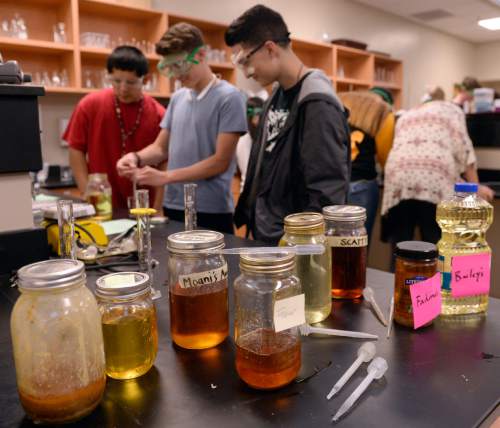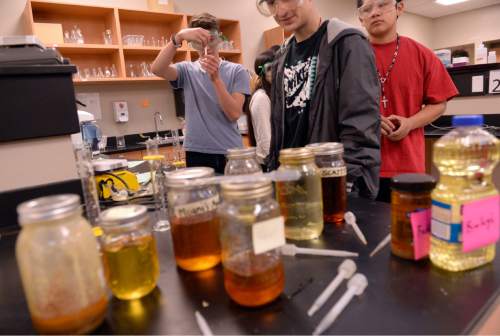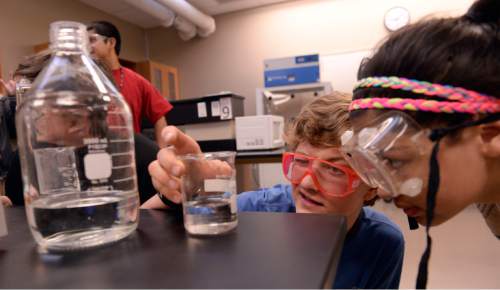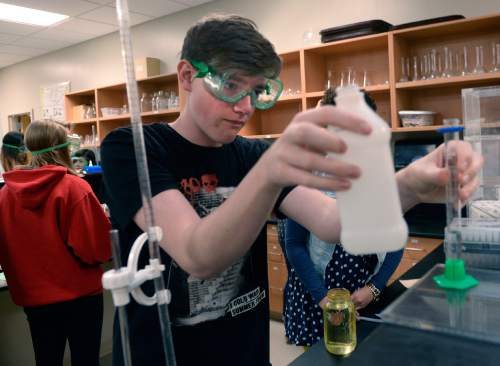This is an archived article that was published on sltrib.com in 2015, and information in the article may be outdated. It is provided only for personal research purposes and may not be reprinted.
After being put on hold in February over concerns about content and clarity, new science education standards earned preliminary approval from a committee of the Utah Board of Education on Thursday.
The new standards for grades six, seven and eight — the first major update to Utah science education in 20 years — will go before the full board Friday and, if approved, will be published for a 90-day public review period prior to final approval.
The board's standards and assessment committee halted the standards in February. But after revisions that consisted largely of removing ancillary material, that same committee reversed their decision this week, clearing the first hurdle for implementation of the standards, which focus on applied learning and experimentation.
"It's not just a list of things to teach," board member Brittney Cummins said. "The whole concept is different, that we're going to explore things."
Utah's science standards received their last major revision in 1994, with minor updates made in 2004, according to Ricky Scott, a science specialist with the Utah State Office of Education.
The proposed standards introduce a greater focus on engineering to Utah's science courses, Scott said, with the expectation that teachers will rely more heavily on student-designed projects and hands-on experimentation.
The new standards also include content updates, Scott said, particularly related to modern technology like wireless Internet and cellular communication.
"We're in such a technology-driven world and it's all based on radio waves," Scott said.
After board members rejected the standards in February, Scott said the feedback he received was that the proposed changes were overly complex.
He said staff worked to make the standards more concise and suitable for public review, but few changes were made to the substantive content of what students will now see in the classroom.
"As far as the content goes, nothing really has changed," he said. "We've simplified them and made it more streamlined."
Vincent Newmeyer, a Lindon parent critical of the proposed standards, agreed with Scott. Newmeyer sat on a draft review committee for the standards and said there is little that distinguishes the standards approved Thursday from the draft that was rejected in February.
"Nothing has been changed," he said.
Newmeyer said the new science standards take a "dogmatic" stance on controversial subjects like evolution and global warming. He gave the example of a standard that asks for students to identify similarities between embryos — which would support evolution — rather than identify both similarities and differences.
"It not only takes a position but it ignores data to the contrary," he said.
Utah's propsed standards are significantly similar to the Next Generation Science Standards, a series of science benchmarks written by a consortium of national experts that are under consideration in several states.
The Next Generation standards have been criticized by some for a perceived left-leaning political agenda, and as a national effort to supplant local control — akin to the Common Core State Standards, which outline grade-level skills in math and English and have been voluntarily adopted by most states.
Newmeyer said he's spoken with several members of the state school board and his recommendation is that Utah forgo a public review period and begin work on a wholly new set of standards.
"I would like them to start over," he said. "They've got a lot invested in this and they're trying to run it across the goal line."
Scott said there are similarities to the Next Generation standards, but added that the update represents the best practices for science education — not a national takeover.
"We want to make sure that the science being taught in Utah is the same science being taught everywhere," he said. "We want to make sure students are truly college- and career-ready."
He said parents like Newmeyer hold valid concerns, and the adoption process includes a 90-day public review period for that reason.
Individuals will be able to review the draft standards and submit feedback, Scott said, and the state Office of Education will also hold informational meetings throughout the state prior to adoption.
"Now is a chance for everyone to weigh in on this," he said.
Board member Laura Belnap, who chairs the board's standards committee, said she appreciated the work of Scott and USOE staff to remove extraneous language that could have been prescriptive to teachers.
"They really are standards and not overreaching for us at the state level," she said.
If approved by the full board on Friday, and later approved for final adoption, Scott said some districts would pilot the new standards during the 2016-2017 school year, with statewide implementation following the next year.
Updated standards for elementary school and high school grades are also scheduled to follow the current proposal.









